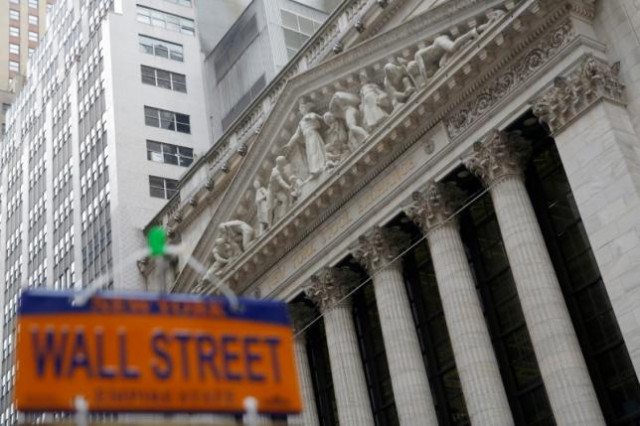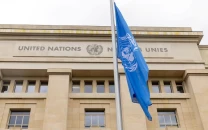Trump's message to bankers: Wall Street reform rules may be eliminated
The business leaders are part of Trump's "Strategy and Policy Forum" that last met with him in February

A souvenir license plate is seen outside the New York Stock Exchange in Manhattan, New York City, US. PHOTO: REUTERS
At the beginning of his administration, Trump ordered reviews of the major banking rules put in place after the 2008 financial crisis, and last week he said officials were planning a "major haircut" for them.
"For the bankers in the room, they'll be very happy because we're really doing a major streamlining and, perhaps, elimination, and replacing it with something else," Trump said on Tuesday.
China will get better U.S. trade deal if it solves North Korea problem: Trump
"That will be the minimum. But we're doing a major elimination of the horrendous Dodd-Frank regulations, keeping some obviously, but getting rid of many," he said.
The White House is not unilaterally able to upend Dodd-Frank’s rules, almost all of which are implemented by independent regulatory agencies like the Securities and Exchange Commission and the Federal Reserve.
A sweeping change to the law would require congressional action, though in some cases regulators may also have wiggle room to make changes through a formal rule-making process.
In February, Trump issued an executive order requiring Treasury Secretary Steve Mnuchin to consult with U.S. regulators and submit a report outlining a proposal for possible regulatory and legislative changes that would help fuel economic growth and promote American business interests.
That report, due to be released in June, will likely serve as a blueprint for possible changes down the road.
Congressional action on a Wall Street bill is not expected in the near term, as Congress focuses primarily on healthcare and tax reform.
On Tuesday, House of Representatives Financial Services Committee Chairman Jeb Hensarling announced that he was planning to introduce a new draft by month's end of sweeping legislation known as the "Financial CHOICE Act" that would give Dodd-Frank a major overhaul.
The new draft of the bill would largely defang the Consumer Financial Protection Bureau's supervisory powers and make the director removable at will.
It would also revamp bank stress-testing rules and loosen securities regulations to help companies raise cash.
The bill is likely to face an uphill battle in the Senate, where Democrats are expected to be resistant and a 60-vote threshold is needed to pass legislation.
Participants in Tuesday's meeting included Rich Lesser, chief executive of Boston Consulting Group; Doug McMillon, chief executive of Wal-Mart Stores Inc (WMT.N); Indra Nooyi, chief executive of PepsiCo (PEP.N); Jim McNerney, former chief executive of Boeing Co (BA.N); Ginni Rometty, chief executive of IBM (IBM.N); and Jack Welch, former chairman of General Electric Co (GE.N).
Trump, May aim to convince Moscow to end Assad support
The business leaders are part of Trump's "Strategy and Policy Forum" that last met with him in February.
Trump also reiterated his criticism of the North Atlantic Free Trade Agreement between the United States, Canada and Mexico.
"NAFTA is a disaster. It's been a disaster from the day it was devised. And we're going to have some very pleasant surprises for you on NAFTA, that I can tell you," he said.



















COMMENTS
Comments are moderated and generally will be posted if they are on-topic and not abusive.
For more information, please see our Comments FAQ